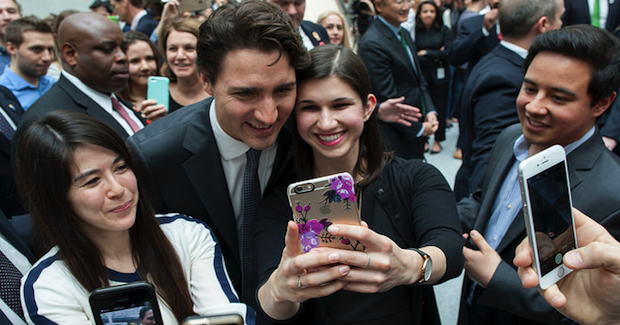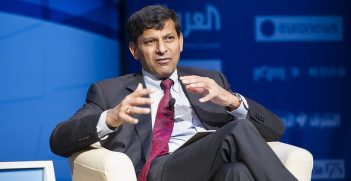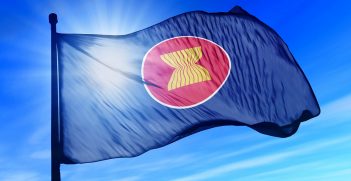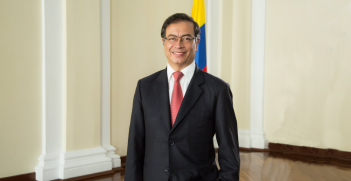Trudeau's First Year in Power

2016 saw the spectacular fall of British Prime Minister David Cameron and the stunning rise of American President-elect Donald Trump. Next year, President Barack Obama will leave office, French president Francois Hollande will not seek re-election, and German Chancellor Angela Merkel, while standing for a fourth term, will have the fight of her political life. Standing as a bulwark against the tide of uncertainty sweeping across Western countries is Justin Trudeau, Canada’s feminist, refugee-loving, pro-LGBT prime minister.
Trudeau’s mission, as described to The Guardian, seems tailor-made for a world where extremism and discontent are on the rise and far-right, anti-establishment parties are gaining ground. “What we’re facing right now—in terms of the rise of populism and divisive and fearful narratives around the world—it’s based around the fact that globalisation doesn’t seem to be working for the middle class, for ordinary people,” said Trudeau.
While Trudeau’s oft-repeated objective of governing for “the middle class and those working hard to join it” proved popular, the majority government his Liberal Party was handed in last year’s federal election was perhaps more a result of Canadians’ sense of frustration with Conservative Prime Minister Stephen Harper, who had been in power for nearly a decade.
Though one would expect some difference in governance with any changing of the guard, it’s hard to overemphasise how much the election of Trudeau has felt like a new chapter—maybe even a whole new volume—in Canadian politics. Where Harper was seen as wanting to freeze out journalists, Trudeau has held frequent press conferences. Where Harper shunned the United Nations, Justin Trudeau arrived with one of the largest delegations to the 2015 Paris climate talks. And where Harper wanted to install a police hotline to report “barbaric cultural practices”, Trudeau personally welcomed Syrian refugees as they landed at Toronto’s Pearson International Airport.
Much of this welcomed change in tone contributed to a prolonged honeymoon for Trudeau. At one year on from the October 2015 election, the prime minister’s approval rating stood at an impressive 65 per cent. By any indicator, the Liberals have had a good first year—keeping more campaign promises than they have broken—and the prime minister has been using his political capital to plough through his to-do list.
Along with the implementation of a tax cut for Canada’s middle income bracket, an agreement to expand the Canadian Pension Plan, various infrastructure deals, the setting out of a carbon-pricing policy, and the securing of a climate deal with eight premiers, Trudeau has signed a nearly scuttled free trade deal with the European Union and launched a National Inquiry into Missing and Murdered Indigenous Women and Girls—an important step towards improving relations with Canada’s indigenous communities.
On the world stage, too, Trudeau has proved a hit with fellow leaders and the international media. His re-engagement with the United Nations and other global institutions was a welcome change from Harper’s more isolationist view of foreign policy. Canada’s model of resettling refugees was praised at the UN as a model for the rest of the world, and International Monetary Fund head Christine Lagarde has said publicly that she hopes Canadian economic policies would “go viral”.
Of course, inevitably, the glow reflected back on Trudeau from his purported “sunny ways” method of governing won’t last forever. The last few weeks before the House of Commons rose for this year’s Christmas break featured several cringe-worthy or mishandled events and were undoubtedly the toughest for the prime minister since he took office.
In the closest thing to a scandal this government has had to weather, the prime minister has been accused of partaking in “cash-for-access” fundraisers, parties and meet-and-greets where attendees (including Chinese billionaires) paid C$1,500 (A$1,500) to hobnob with him and other high-ranking ministers. The point is not that the practice is against the law—indeed such events are perfectly legal in Canada—but that Trudeau specifically and publicly, in guidelines to his ministers, stated that “there should be no preferential access, or appearance of preferential access” in return for political contributions.
Electoral reform, too, has been a bee in the prime minister’s bonnet over the past couple of months. During his campaign, Trudeau promised to replace Canada’s first-past-the-post voting system by the next election, in 2019. Towards the end of November, an all-party committee recommended a national referendum on a more proportional system—the clear preference of those who voiced their opinions at the many town hall meetings organised by the committee. But in a surprising u-turn, the five Liberal MPs on the committee dissented, saying the proposals in the report were too “radical” and their own prime minister’s deadline of 2019 was too “rushed”.
In a bizarre incident in the House of Commons, Trudeau’s Democratic Institutions Minister Maryam Monsef slammed the committee for “taking a pass” on recommending a specific alternative to the current system, despite that not being in its mandate (though she later apologized). The effect has been to paint the government’s electoral reform strategy as either dithering and confused or just not a priority now that the Liberals have a comfortable majority.
When considering these and other mini-crises — Trudeau’s ill-thought-out words following the death of Fidel Castro, for example, or the continued opposition to the signing of a controversial Saudi arms deal worth C$15 billion—one has to wonder if the prime minister fully appreciates how he is being received in the media and by the public. As of mid-December, Trudeau’s approval rating was at 55 per cent—still remarkably high, but a 10-point drop since October.
As the House of Commons takes a pause, it would seem that Trudeau has been saved by the silver bells of the holiday season. Next year will bring more challenges: an American president under whom the future of NAFTA and NATO are uncertain; the balancing of Canada’s Paris climate agreements with approved pipeline projects and the interests of the Canadian economy; continued sparring with provincial ministers over healthcare funding; and the list goes on.
As he looks at 2017, the prime minister might do well to remember that this will likely be a year where Canadians judge him not simply against the yardstick of the Harper government, or by comparing him to less-than-desirable or outright worrisome world leaders, but on his own merits and his ability to live up to the values and promises that got his government elected. Progressives around the world—so desperately in need of a good news story—will be watching.
Catherine Tsalikis is the senior editor for OpenCanada.org, an international affairs website based in Toronto. Previously, she worked at CBC and CTV in Toronto, and Sky News and Chatham House in London, UK.
This article is published under a Creative Commons Website and may be republished with attribution.





